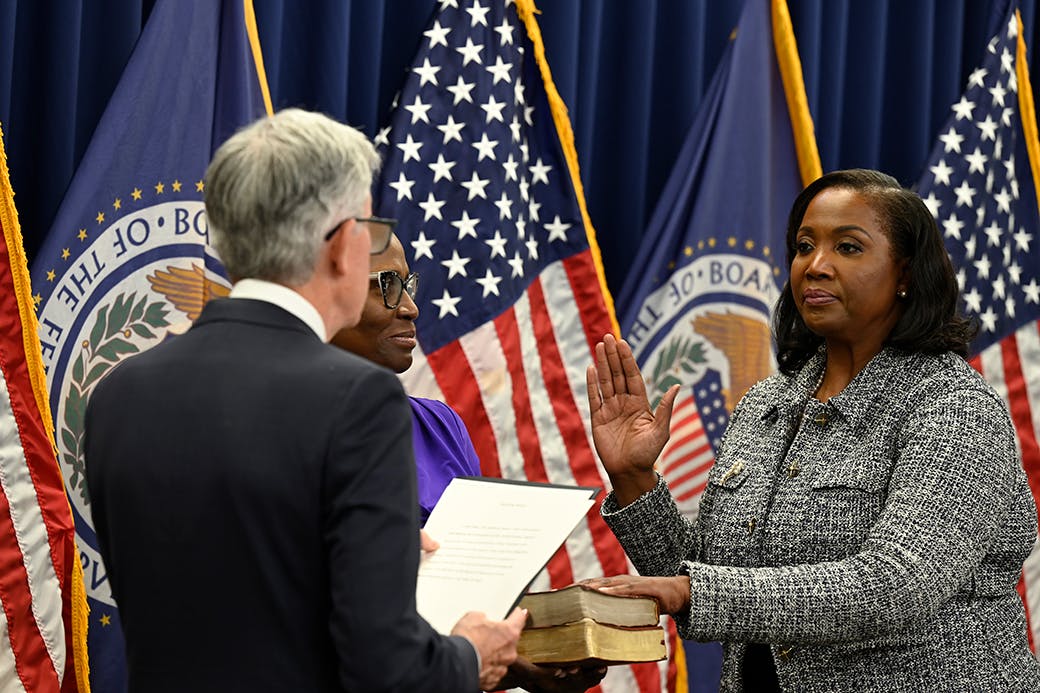Michigan State University professor and American economist Lisa Cook was confirmed to the Federal Reserve’s Board of governors, making her the first Black woman to serve on the board in the institution’s 108-year history.
However, her journey to this historic position was not easy.
Who is Lisa Cook?
Before earning her prestigious position on the board of governors, Cook served simultaneously as an MSU professor and as a prominent American economist.
Among her accomplishments are working as a Research Associate at the National Bureau of Economic Research, authoring a multitude of published articles, book chapters and working papers.
Cook also served on the Advisory Boards of the Federal Reserve Bank of Chicago, the National Science Foundation, the Opportunity and Inclusive Growth Institute of the Federal Reserve Bank of Minneapolis, and the Lemelson Center for the Study of Invention and Innovation.
Prior to her nomination from President Joe Biden, Cook served on Biden’s and Vice President Kamala Harris’ transition team where she assisted in reviewing agencies such as the Commodity Futures Trading Commission, the Federal Deposit Insurance Corp., the Federal Reserve, the National Credit Union Administration and the Securities and Exchange Commission.
Additionally, Cook held the position of senior economist at the President’s Council of Economic Advisers under the Obama administration where she worked on the eurozone, financial instruments, innovation and entrepreneurship.
Cook’s nomination to the board
On Jan. 14, 2022, Biden announced the nomination of Cook to serve on the Board of Governors of the Federal Reserve System.
“(Philip) Jefferson and Cook are talented economists with decades of experience working on a broad range of economic issues,” President Biden said in a statement on his nominations. “Together with Chair (Jerome) Powell and Dr. (Lael) Brainard, who I renominated last month, this group will bring much-needed expertise, judgement and leadership to the Federal Reserve while at the same time bringing a diversity of thought and perspective never seen before on the Board of Governors.”
The Board of Governors is run by seven President-nominated and Senate-confirmed members, or “governors.” The governors guide the Federal Reserve System to promote the goals and fulfill the responsibilities given by the Federal Reserve Act. Additionally, they serve on the Federal Open Market Committee, the body within the Federal Reserve that sets monetary policy.
Cook faces intense online criticism
Cook’s nomination proved to be divisive with some praising her as “perfect” for the position and others labeling her nomination a “mistake.”
U.S. Sen. Gary Peters (D-MI.) and U.S. Sen. Debbie Stabenow (D-MI.) both tweeted their support of Cook a day before the Senate Banking Committee was set to vote on her nomination.
Tweets from U.S. Sen. Tom Cotton (R-AR.) and U.S. Sen. Kevin Cramer (R-ND.) stand in stark contrast. Cotton and Cramer questioned Cook's qualifications, beliefs and capabilities for this position.
Support student media!
Please consider donating to The State News and help fund the future of journalism.
Other Republicans took to the media to pronounce their opposition to Cook’s confirmation.
Cramer told Fox Business that Cook “is just not fundamentally qualified in my mind.” Former Trump advisor Peter Navarro stated in a Daily Caller interview that Cook’s nomination was “purely race-based.”
Yet, online criticism would prove to be the least of Cook’s concerns when Republicans began to block her confirmation and disqualify her accomplishments on the Senate floor.
Tension in the Senate
During Cook’s confirmation hearing before the Senate Banking Committee on Feb. 3, Sen. Pat Toomey (R-PA.) said “I’m concerned that Prof. Cook will further politicize an institution that must remain apolitical,” citing her support of race-based reparations and opposition to fossil fuels. Sen. Bill Hagerty (R-TENN.) accused her of making mischaracterizations about her background and qualifications.
Two weeks later, on Feb. 15, the confirmation of Cook and four other Federal Reserve nominees was delayed indefinitely when Republican members of the Senate Banking Committee boycotted a vote to move forward with the nominees’ confirmations. Although Democrats control the committee, with no Republicans in attendance, votes could not take place under the rules.
Republicans were actually boycotting Sara Bloom Raskin’s nomination to top banking regulator, but the incident still set Cook’s confirmation back and little was heard on her confirmation process until it was delayed again on March 16 when Republican members of the Senate Banking Committee showed up to unanimously vote against her.
This then moved the vote to the Senate floor and on March 29, the Senate voted along party lines, 50-49, to advance Cook’s nomination. All 50 Democratic Senators voted to advance her. 49 Republican Senators voted against her. Sen. John Kennedy (R-LA.) did not vote.
On April 27, Cook’s confirmation was delayed yet again, but this time, by Democrats. Sen. Ron Wyden (D-OR.), Sen. Chris Murphy (D-CT.) and Harris were all in quarantine after testing positive for COVID-19, and therefore, Cook was missing three essential votes.
Due to the necessity of every Democratic vote, Senate Banking Committee Chairman Sherrod Brown (D-OH.) asked Republicans to delay the vote. Toomey objected.
Cook’s nomination failed this day, with a 51-47 vote, but Senate Majority Leader Chuck Schumer (D-NY.) filed a motion to reconsider her nomination at a later date.
Cook is confirmed
Finally, on May 10, Cook made history as the first Black woman on the Federal Reserve Board of Governors after she was confirmed on a party-line vote of 51-50. Harris, the first Black woman to serve as vice president, cast the deciding vote.
Despite the fierce backlash she received on the way, Cook’s supporters always believed in her capabilities and her qualifications.
Chief Community Engagement Officer of The Sadie Collective and Cook's mentee Kayla Jones says that Cook is well-deserving of the role.
“I think that she will be a great asset and she’s extremely qualified,” Jones said.
Discussion
Share and discuss “Inside Lisa Cook's path to the Federal Reserve Board of Governors” on social media.







